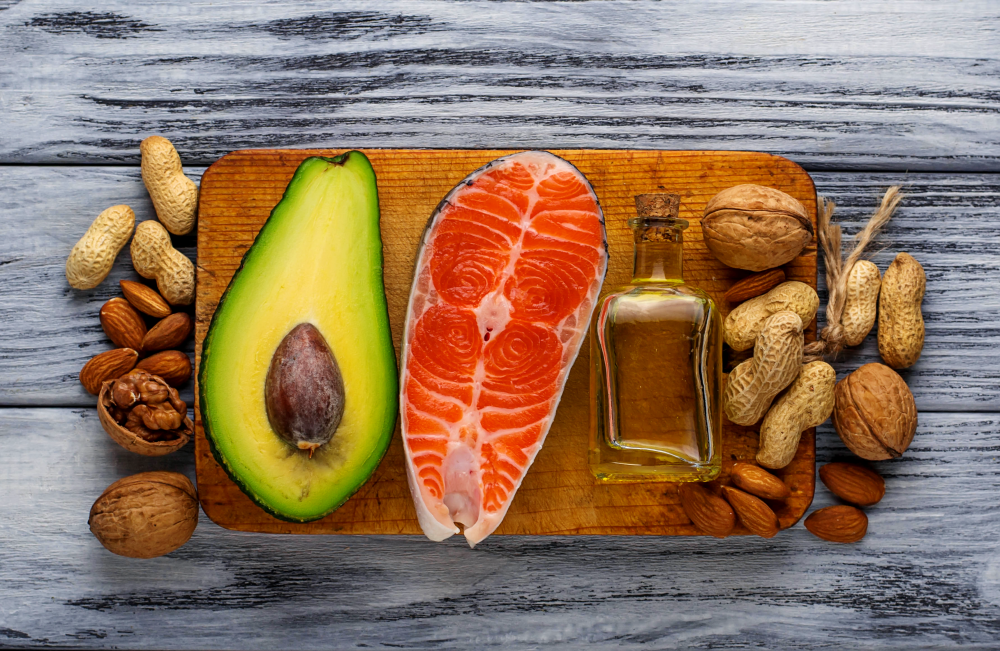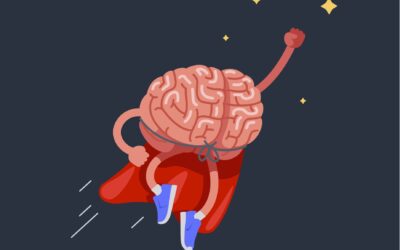Fat is one of three macronutrients found in food that is essential for cell survival in humans. However, it is often demonized as being “unhealthy”. But that couldn’t be further from the truth. Some fats have been linked to improved cognition and decreasing the risk of neurodegenerative disease. With that said, not all fat is created equal. There are two main fat groups.
Saturated fats are found in meat and dairy and unsaturated fats found in vegetable oils, nuts, and fish. Some saturated fats can be harmful if consumed in large amounts. On the other hand, unsaturated fats have significantly greater health benefits.
In this article, you will learn the difference between saturated and unsaturated fats, and how to select the best foods to get the maximum health benefits.
Health Benefits of Dietary Fats
Fat, also called triglycerides, have a number of health benefits.
- Energy: Fats are used for energy once glucose in the blood is depleted. Excess fat gets stored in the fat cells and in the liver. Fat provides 9 calories/ gram and therefore is a more concentrated source of energy compared to carbohydrates and protein (which provide 4 calories/gram). They are an important source of fuel for the body, especially during prolonged exercise or when carbohydrate stores are low.
- Nutrient absorption: Fats are necessary for the absorption of fat-soluble vitamins (A, D, E, and K) and other important nutrients such as carotenoids.
- Hormone production: Fats are essential for the production of hormones, including sex hormones and adrenal hormones.
- Cell membrane structure: Fats are a major component of cell membranes, helping to maintain their structure and function.
- Brain function: Fats are important for brain function, as the brain is composed of about 60% fat. Adequate intake of omega-3 fatty acids, in particular, has been linked to improved cognitive function and a reduced risk of dementia.
- Skin health: Fats are important for maintaining healthy skin, as they help to keep it moisturized and supple.
But as stated earlier, not all fats are created equal, and some types of fats can have negative health effects.
Harms associated with trans fatty acids (trans fat)
Trans fats, also known as partially hydrogenated vegetable oil is far more harmful than saturated fats. The most common type of trans fat is man-made. It’s created through a manufacturing process called hydrogenation and is used to extend the shelf life of food products.
Trans fats are known to:
- Increase LDL cholesterol (bad cholesterol) and decrease HDL cholesterol (good cholesterol) in the blood
- Impair insulin sensitivity: Trans fats may impair insulin sensitivity, which can increase the risk of type 2 diabetes.
- Harmful effects on the brain: Trans fats have been linked to cognitive decline and an increased risk of Alzheimer’s disease.
- No nutritional value: Trans fats provide no nutritional value and are not essential for health.
- Increase inflammation: Trans fats can increase inflammation in the body, which is linked to a variety of health problems, including heart disease, diabetes, and cancer.
The good news is that these fats are so bad they have been ban in most countries. However, there is a little loop hole in the “rules” and if there is less than 0.5 grams/serving, food manufacturers can put “0 grams” on the label.
That said, it is important to recognize the types of foods that may contain these harmful fats and make the effort to avoid them.
Foods that contain potentially harmful amounts of trans fats
- Fast foods—including tater tots, and French fries
- Most spreads—such as margarine spreads or peanut butter
- Snack foods—such as chips, crackers, and cookies
- Fried foods—including fried chicken, onion rings, and nuggets
- Nondairy creamer
- Pre-prepared cake frostings
- Vegetable shortening
- Commercially pre-prepared products, such as pie crusts, pizza dough, and cookie dough
- Pastries, donuts, and pies
“Healthy Fats”
Healthy fats are types of fats that provide important health benefits.
Here are some examples of healthy fats:
Monounsaturated fats
These fats are found in foods such as olive oil, avocados, nuts (such as almonds, cashews, and peanuts), and seeds (such as pumpkin and sesame seeds). They can help to lower LDL (bad) cholesterol levels and reduce the risk of heart disease.
Polyunsaturated fats
These fats are found in foods such as fatty fish (such as salmon, mackerel, and sardines), flaxseeds, chia seeds, and walnuts. They are important for brain function and can help to reduce inflammation in the body.
Omega-3 fatty acids
These are a type of polyunsaturated fat that are particularly important for heart health and brain function. They are found in fatty fish, flaxseeds, chia seeds, and walnuts.
Saturated fats
While saturated fats have been traditionally considered unhealthy, recent research suggests that some types of saturated fats (such as those found in coconut oil and grass-fed butter) may have health benefits when consumed in moderation.
It’s important to note that all fats are high in calories, so it’s important to consume them in moderation as part of a balanced diet. Aim to replace unhealthy fats (such as trans fats and saturated fats from processed foods) with healthy fats from whole foods.
Other articles you may be interested in:
Stroke Arm Rehab Daily Exercise Routine
A stroke or damage to the neurons in the brain can cause the inability to move the arm. It can also cause stiff and tight arm muscles. A stroke arm rehab routine should incorporate the principles of neuroplasticity (the ability of the brain to rewire when presented...
What is your Ikigai?
Not everyone wants to live a long life. But what about a happy and healthy life? If this is you, sit down and pull up a chair. Ikigai might be the answer.
Implications of Sleep and Neurological Rehabilitation
https://youtu.be/FWIX8Ht6bm4 Good quality sleep can dramatically improve neurologic rehabilitation outcomes. Getting adequate sleep might also decrease the rate of disease progression in some neurodegenerative diseases (multiple sclerosis, Parkinson's disease, or...
Stroke Rehabilitation: Overcoming Mental Barriers
Dealing with the aftermatch of a stroke can lead to a whirlwind of emotions including confusion, hopelessness, disappointment, and even despair. If you are in the process of recovery, these emotions are completely normal. Here I break down some of the most common...
Arm Exercises For Stroke Patients (Early Stage)
Arm exercises after a stroke are critical and should be performed daily. Here are the best exercises and why you should be doing these every day. Who will benefit from early-stage stroke arm exercises? The early stage of recovery is considered the first 6 months after...
Not what you get, but what you become
"What you get by achieving your goals is not as important as what you become by achieving your goals." -Zig Ziglar I often get messages from people who are feeling discouraged. "Progress isn't fast enough". "The process is too challenging". Oh, and by the way, "this...
The Gift of Language
“I will never do (X) ” “I Can’t” “I am always going to be this way” “I will be this way forever” “This is impossible” If you have been following me for a while, you know that I discourage this type of language. It is self-limiting at best, and self-destructing at...
Balance Exercises For Stroke Patients
Balance exercises for stroke patients are critical for improving walking confidence and returning to normal life What is Balance? Balance is the ability to maintain the center of mass (the body) within the base of support (the feet). Balance is also the ability of the...
Best Exercise Equipment for Multiple Sclerosis
If you have multiple sclerosis, home exercise equipment is critical for maintaining mobility. Neuroplasticity is the brain's ability to re-organize dependent upon exposure to new or novel experiences. After an acute exacerbation, neuroplasticity requires thousands of...
Best Brain Exercises For Stroke Recovery
Best Brain Exercises For Stroke Recovery A stroke can cause long-term damage to the brain, impair movement, and significantly diminish cognitive abilities. Mobility and strength training to retrain the muscles after a stroke is a huge part of the stroke recovery...










